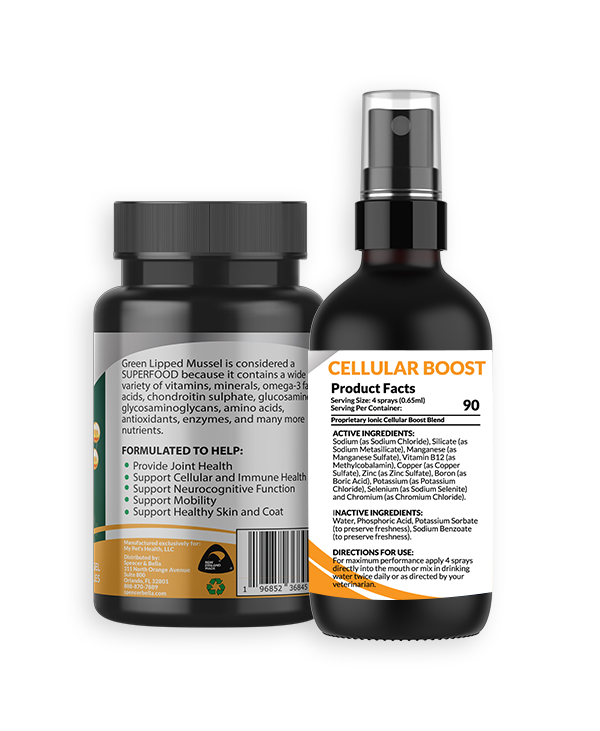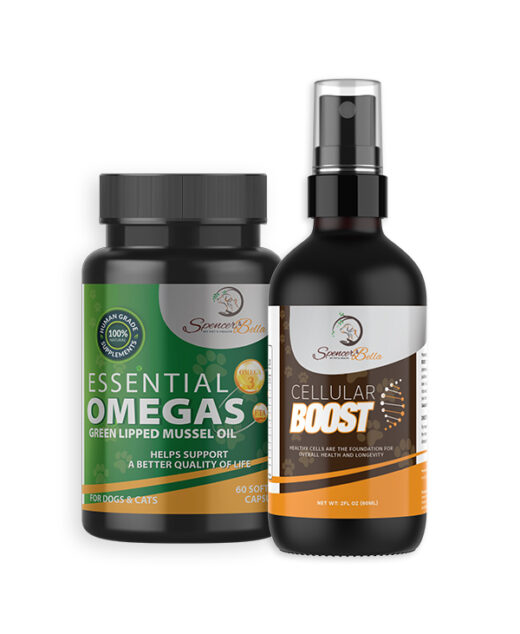Valentine’s Day is a time when matters of the heart come to the forefront of our minds, reminding us of the love and affection we share with those closest to us. Among the most cherished in our lives are our pets, whose unconditional love and companionship enrich our daily lives. This Valentine’s Day let’s extend our celebration of love by focusing on the heart health of our beloved dogs and cats. Just as we care for the hearts of our loved ones, ensuring the cardiovascular well-being of our pets is vital for their longevity and happiness.
With a commitment to our pets’ well-being, we’re excited to emphasize the vital role of maintaining a robust cardiovascular system for our furry companions. In this comprehensive guide, we’ll delve into common heart issues affecting pets, identify key symptoms to monitor, and explore available treatment options. Additionally, we’ll uncover the impactful benefits of incorporating heart-supportive supplements like Essential OMEGAS and Cellular BOOST into their daily care regimen, empowering them to lead healthier, happier lives.
Join us in making this Valentine’s Day about more than just chocolates and flowers—let it be a time when we also commit to the heart health of our pets, ensuring they remain by our sides, healthy and vibrant, for many more years to come.
Understanding Pet Heart Health
Heart health is fundamental to the overall well-being of our pets, influencing not just their vitality but their quality of life. To fully appreciate the importance of heart health in pets, it’s essential to understand the basic anatomy and function of the pet heart, as well as the reasons why maintaining a healthy heart is crucial.
Overview of Why Heart Health is Crucial for Pets
The heart is at the core of the cardiovascular system, responsible for pumping blood throughout the body to deliver oxygen and nutrients to every cell while removing waste products. A healthy heart ensures that this vital process operates efficiently, supporting other bodily functions and enabling our pets to thrive. Good heart health allows pets to play, explore, and engage with us actively, contributing to their happiness and strengthening our bond with them.
Heart disease can significantly impact a pet’s quality of life, leading to symptoms like fatigue, difficulty breathing, and reduced ability to exercise. These changes can be distressing for both pets and their owners. Furthermore, heart conditions can lead to other serious health issues, emphasizing the importance of prevention, early detection, and proper management.
Basic Anatomy and Function of the Pet Heart
The heart of a pet functions similarly to that of a human’s, consisting of four chambers: two atria (upper chambers) and two ventricles (lower chambers). The right side of the heart pumps deoxygenated blood to the lungs, where it picks up oxygen and releases carbon dioxide. The left side receives this oxygenated blood from the lungs and pumps it out to the rest of the body.
Valves between the atria and ventricles ensure blood flows in the correct direction, preventing backflow and maintaining efficient circulation. The heart’s electrical system controls the heartbeat, ensuring the heart muscles contract in a coordinated manner to pump blood effectively.
Understanding the heart’s anatomy and function highlights the complexity of this vital organ and the importance of keeping it healthy. Factors like genetics, diet, exercise, and overall health management play significant roles in maintaining heart health. By recognizing the signs of heart disease early and taking preventive measures, such as incorporating heart-supportive supplements like Essential OMEGAS and Cellular BOOST, pet owners can help their pets lead longer, healthier lives.
Common Heart Issues in Pets
Heart health is a critical aspect of your pet’s overall well-being. Understanding the common heart issues, their symptoms, and available treatment options can empower pet owners to better care for their furry friends. Here, we combine the issues, symptoms, and treatments into a cohesive format for easier reading and understanding.
Dogs
- Canine Dilated Cardiomyopathy (DCM)
- Symptoms: Reduced exercise tolerance, coughing, difficulty breathing, episodes of collapse, abdominal swelling due to fluid accumulation.
- Treatments: Treatment may include medications like ACE inhibitors, diuretics to remove excess fluid, beta-blockers to manage heart rate, and dietary modifications including taurine and carnitine supplements.
- Valvular Disease
- Symptoms: Persistent coughing, difficulty breathing, fatigue, fainting, and weight changes due to fluid retention.
- Treatments: Medications such as diuretics, ACE inhibitors, and in some cases, surgery are used to manage this condition, along with regular monitoring of heart function.
- Arrhythmias
- Symptoms: Fainting or sudden collapse, irregular heartbeat, weakness, and reduced exercise ability.
- Treatments: Treatment options include anti-arrhythmic medications, beta-blockers, and in severe cases, a pacemaker to regulate the heartbeat.
Cats
- Hypertrophic Cardiomyopathy (HCM)
- Symptoms: Lethargy, rapid or difficult breathing, loss of appetite, hind leg paralysis, fainting.
- Treatments: Management often involves beta-blockers or calcium channel blockers to control heart rate, medications to prevent blood clot formation, and supportive care for heart failure symptoms.
- Thromboembolism (often a consequence of HCM)
- Symptoms: Sudden hind leg paralysis, pain in hind legs, cold hind legs, difficulty breathing.
- Treatments: This condition requires immediate veterinary attention. Treatments include pain management, medications to dissolve or prevent further blood clots, and in some cases, surgical intervention.
- Congenital Heart Defects
- Symptoms: Symptoms may vary but can include fatigue, difficulty breathing, coughing, and fainting.
- Treatments: Treatment depends on the specific defect and may range from medications to manage symptoms to surgical correction of the defect.
The Role of Nutrition and Supplements in Heart Health
Proper nutrition plays a pivotal role in maintaining the heart health of pets. A balanced diet enriched with specific nutrients can significantly bolster cardiovascular function, laying the foundation for a vibrant, active life. Among the myriad of supplements available, Essential OMEGAS and Cellular BOOST stand out for their unique benefits and synergistic effects on heart health. Here, we delve into how these two products work together to support and enhance the cardiovascular well-being of our pets.
Importance of a Balanced Diet and Specific Nutrients for Heart Health
A diet that supports heart health should include a balanced mix of proteins, fats, carbohydrates, vitamins, and minerals. Key nutrients such as Omega-3 fatty acids, antioxidants, and amino acids are especially beneficial for maintaining a healthy heart. Omega-3s, for example, are known for their anti-inflammatory properties and ability to improve heart muscle function and blood circulation.
Essential OMEGAS: A Premium Source of Omega-3s
Essential OMEGAS is derived from the pristine waters of New Zealand, harnessing the power of green-lipped mussel oil to provide a superior source of Omega-3 fatty acids. These fatty acids are crucial for reducing inflammation within the body and supporting the overall health of the cardiovascular system. Regular supplementation with Essential OMEGAS can help maintain optimal heart function, promote healthy blood flow, and protect against heart disease.
- Benefits of Essential OMEGAS:
- Enhances the elasticity of blood vessels.
- Reduces the risk of heart disease by lowering blood pressure and improving lipid profiles.
- Supports the health of cardiac tissues and improves heart function.
Cellular BOOST: Advancing Heart Health on a Cellular Level
Cellular BOOST takes a novel approach to heart health by focusing on the cellular aspects of cardiovascular function. This supplement promotes the health and efficiency of red blood cells, which are vital for transporting oxygen and nutrients to the heart and other organs. Improved cellular health means better oxygenation and nutrient delivery, directly supporting heart function and endurance.
- Synergistic Effects with Essential OMEGAS:
- While Essential OMEGAS provides the foundational Omega-3 fatty acids needed for reducing inflammation and supporting heart muscle function, Cellular BOOST enhances this effect by ensuring that the heart and other organs receive an optimal supply of oxygen and nutrients.
- This combination addresses heart health from multiple angles, offering a comprehensive approach to cardiovascular care.
Combining Essential OMEGAS and Cellular BOOST for Optimal Heart Health
Together, Essential OMEGAS and Cellular BOOST provide a holistic strategy for maintaining and enhancing heart health in pets. By addressing both the nutritional and cellular needs of the heart, these supplements work synergistically to improve cardiovascular function, reduce the risk of heart disease, and support the overall well-being of pets. Incorporating these supplements into your pet’s care regimen, alongside a balanced diet, can significantly contribute to their heart health and longevity.
Preventive Measures and Lifestyle Changes
Preventing heart disease in pets involves a multifaceted approach that includes diet management, regular exercise, and consistent veterinary care. Implementing these preventive measures and lifestyle changes can significantly reduce the risk of heart-related issues, ensuring pets lead healthier, more active lives. Here, we explore practical tips for heart disease prevention and the critical role of early detection and regular monitoring of heart health.
Tips for Preventing Heart Disease in Pets
- Balanced Diet: Feed your pet a balanced diet rich in essential nutrients. Incorporate foods high in Omega-3 fatty acids, like those found in Essential OMEGAS, to support cardiovascular health. Consult with a veterinarian to determine the most appropriate diet plan for your pet’s specific needs, considering their age, breed, and health status.
- Regular Exercise: Maintain a regular exercise routine to help your pet stay at a healthy weight. Exercise improves cardiovascular fitness, helps manage weight, and reduces the risk of heart disease. Tailor the type and intensity of exercise to your pet’s breed, age, and health condition to avoid overexertion.
- Avoid Exposure to Tobacco Smoke: Secondhand smoke is harmful to pets and can increase the risk of heart disease. Ensure your pet lives in a smoke-free environment to protect their cardiovascular health.
- Regular Veterinary Check-ups: Schedule regular check-ups with your veterinarian. These visits are crucial for early detection of potential heart issues and can help manage existing conditions before they become more serious.
- Dental Care: Good oral hygiene can prevent periodontal disease, which has been linked to heart disease in pets. Regular dental check-ups and cleanings are essential parts of your pet’s overall health care regimen.
The Importance of Early Detection and Regular Monitoring
Early detection and regular monitoring of heart health are vital components of preventive care. Many heart conditions, when caught early, can be managed effectively with medication, dietary changes, and lifestyle adjustments, significantly improving the quality of life for your pet.
- Annual Health Screenings: Include heart health evaluations as part of your pet’s annual check-up. These evaluations can include physical examinations, blood tests, and diagnostic imaging (such as X-rays or echocardiograms) to assess heart function and detect any abnormalities early on.
- Monitoring at Home: Be vigilant for signs of heart disease (e.g., coughing, difficulty breathing, fatigue) and report any changes in your pet’s health to your veterinarian promptly. Keeping a log of your observations can be helpful in tracking your pet’s health over time.
- Collaborate with Your Veterinarian: Work closely with your veterinarian to develop a comprehensive care plan tailored to your pet’s individual needs. This plan may include dietary recommendations, an exercise regimen, supplements like Essential OMEGAS and Cellular BOOST, and regular monitoring strategies to ensure optimal heart health.
Conclusion
As we’ve explored throughout this guide, the health of our pets’ hearts is integral to their overall well-being and quality of life. Understanding, detecting, and treating heart issues in pets are essential steps in ensuring they lead long, happy lives by our side. From recognizing the signs of heart disease to implementing effective treatment plans, the role of a pet owner extends beyond love and companionship to include vigilant care and preventive measures.
We cannot overemphasize the importance of a holistic approach to pet health. A balanced diet, regular exercise, and consistent veterinary care form the cornerstone of preventing heart disease. Additionally, supplements like Essential OMEGAS and Cellular BOOST play a supportive role in enhancing heart health, offering a comprehensive strategy to combat cardiovascular issues. These supplements, backed by scientific research and crafted with high-quality ingredients, provide targeted nutritional support that addresses the heart’s needs at both the macro and cellular levels.
Pet owners are encouraged to view the care of their pets through a holistic lens. This means considering not just immediate health concerns but also long-term wellness strategies that include preventive care. Incorporating heart-supportive supplements, such as Essential OMEGAS and Cellular BOOST, into your pet’s daily regimen can make a significant difference in their cardiovascular health.
For more information on how Essential OMEGAS and Cellular BOOST can contribute to your pet’s heart health and to explore the science behind these innovative supplements, visit:
Taking proactive steps in caring for your pet’s heart health ensures that the bond you share continues to thrive. Let this Valentine’s Day be a reminder of the heart’s significance—not just as a symbol of love but as the lifeline for our cherished pets.
Q & A
Q: How can I prevent my dog from getting heart failure?
A: To prevent heart failure in dogs, integrating Essential OMEGAS into their diet is key. This supplement provides high-quality omega-3 fatty acids, which are crucial for reducing inflammation and the risk of heart failure. Along with a balanced diet, moderate exercise, and regular veterinary check-ups, Essential OMEGAS supports overall heart health and can be a vital part of your pet’s heart disease prevention strategy.
Q: What is the most common cause of heart failure in dogs?
A: The primary cause of congestive heart failure (CHF) in dogs is mitral valve insufficiency (MVI), accounting for approximately 80% of cases. MVI leads to left-sided congestive heart failure, where the heart cannot pump blood efficiently. Other significant causes include cardiomyopathy, which affects the heart muscle, arrhythmias involving rhythm irregularities, and constriction of major blood vessels. These conditions highlight the importance of regular veterinary assessments for early detection and management.
Q: What are signs of heart issues in dogs?
A: Indicators your dog may be experiencing heart problems can encompass a range of symptoms such as persistent coughing and labored breathing. You might also notice a decrease in stamina during walks or playtime, alongside episodes of weakness or even collapse. Additionally, an enlarged abdomen due to fluid accumulation and sudden weakness or paralysis in the hind legs are significant signs pointing towards potential heart disease.
Q: Does omega-3 help with heart health in dogs?
A: Yes, omega-3 fatty acids, particularly DHA (Docosahexaenoic acid) and EPA (Eicosapentaenoic acid), are incredibly beneficial for dogs, including their heart health. These crucial nutrients, primarily sourced from marine life, are known for their anti-inflammatory effects, which support not only the skin and joints but also the cardiovascular system. Omega-3s contribute positively to heart health, as well as to the well-being of eyes, kidneys, brain, and the immune system. Unique among sources of omega-3s, green-lipped mussel contains ETA (Eicosatetraenoic acid), an omega-3 fatty acid that’s not found in other marine animals, offering additional anti-inflammatory benefits that further support the heart and overall health of dogs.
Q: Can I give my dog omega-3 every day?
A: Yes, providing omega-3 supplements daily to your dog is beneficial for their health, and Essential OMEGAS comes highly recommended by veterinarians. It supports heart health, skin, joints, and cognitive functions. Ensure you follow the dosage guidelines suited for your dog’s size and needs, as advised by a veterinarian, when using Essential OMEGAS.
Q: Can I give my cat omega-3 every day?
A: Absolutely, daily omega-3 supplementation is advantageous for cats, with Essential OMEGAS being a veterinarian-recommended choice. It aids in maintaining heart health, enhancing skin and joint mobility, among other benefits. When incorporating Essential OMEGAS into your cat’s daily diet, it’s crucial to adhere to the recommended dosage and consult a veterinarian to ensure it meets your cat’s specific nutritional requirements.
Q: How can I improve my pet’s blood flow for better heart health?
A: Enhancing your pet’s blood flow is crucial for optimal heart health, and Cellular BOOST is a top recommendation by veterinarians for this purpose. This supplement is designed to support cardiovascular health by improving circulation and ensuring efficient oxygen and nutrient delivery throughout the body. Incorporating Cellular BOOST into your pet’s daily regimen can significantly contribute to better heart function and overall vitality. Alongside a balanced diet and regular exercise, Cellular BOOST helps maintain a strong cardiovascular system, ensuring your pet enjoys a healthier, more active lifestyle.
Cellular BOOST & Essential OMEGAS Bundle
$84.00 - or Subscribe and Save 10%






